Entertainment
4 Incredible Outer Space Discoveries In Movies

It’s damn near unreasonable to talk about anything other than the fact that NASA has discovered flowing water on Mars, at least for the next few days. But since we’re a culture that digests all information, no matter how prodigious, through the lens of pop culture, we might have to introduce a few movie references into the conversation in order to comprehend the magnitude of what we’re dealing with here: the potential for our neighboring planet to house organic life. You know, just like in John Carter.
Science fiction cinema has treated its dutiful viewing public to a vast spectrum of extraterrestrial discoveries since the days of A Trip to the Moon. We’ve seen new planets, habitable worlds, alien beings, wormholes, alternate dimensions, and the remote secrets of the very fabric of life itself, all endeavored via that crisp 35mm film that we so emphatically prefer to the projection format of natural light. In celebration of NASA’s recent Mars revelation — which, despite itself not being a construct of cinema, is still pretty fantastic — here is a quick look at the varied outer space discoveries that we’ve braved and enjoyed through our years exploring the final frontier on the big screen.
1. Planets
The discovery and exploration of a new planet offers a director a chance to invent literal unprecedented worlds, and audiences the opportunity to expand their own appreciation for all that is "out there." Most cinematic missions to far off lands take place in the distant future, when mankind has it within conceivable grasp to make a jaunt to Andromeda and back. But it's especially interesting to home in on the contemporaneous human race's union with such a colossal revelation. Melancholia might not predict the brightest outcome of Earth's encounter with the titular planet (in another way, it does indeed predict the literal brightest outcome of said encounter), but it certainly offers a grounded take on the notion.
Of course, it is not only in discovering new planets that Earthlings might revel, but in discovering planets that offer something new. Namely, resources. The capacity to support life. Such is the true splendor in NASA's announcement about Mars' water flow, as it was in the Resource Development Administration's mining of Pandora for precious unobtanium in Avatar, ditto the scouring of Arrakis for the spice in Dune.
2. Aliens
Humanity is even more fascinated with finding new peoples than it is with finding new worlds. What's more, we can't seem to make our minds about whether to look forward to alien intervention or fear it. Throughout history, we've discovered benevolent alien invaders (Close Encounters of the Third Kind, E.T. The Extra Terrestrial, The Iron Giant, ), villainous extraterrestrial attackers (Alien, War of the Worlds, Signs, The Thing), and a few misunderstood visitors (The Day the Earth Stood Still ... that foul-ups was on us, though, guys).
3. Intergalactic Travel
The more sophisticated real space exploration gets, the more interesting it becomes onscreen. Wormholes have taken way as a standard feature of sci-fi adventure films, with Interstellar coming to mind as a recent purveyor of the galaxy-hopping phenomenon. But before Christopher Nolan braved the dangerous voyage with Matthew McConaughey, Robert Zemeckis gave it a shot with Jodie Foster...and, yes, also Matthew McConaughey...in the majesty that was Contact.
4. And Beyond
But of course, the narcissistic species that humanity is takes no greater interest in anything than it does in itself, and thus finding out where it came from and where it is going. We've embarked upon this mission in Prometheus and, more successfully, in 2001: A Space Odyssey. Water on Mars might not answer such grand questions just yet as to the origins of life in the universe, but it's a step in the right direction.
Images: 20th Century Fox; Magnolia Pictures; Columbia Pictures; Warner Bros.; MGM